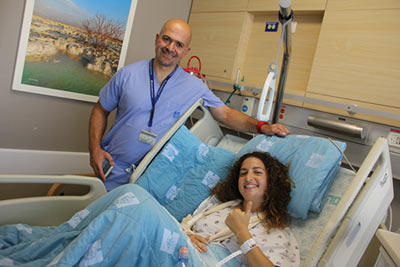
The setting was the 20th Maccabiah Games–the Jewish Olympics in Jerusalem–when suddenly an athlete from Germany fell on a fellow competitor from Mexico. “I heard my bone break,” Tania Hafif said. “It really hurt.”
Ms. Hafif, a star of Mexico’s national “football” (soccer) team, was rushed by ambulance to Hadassah Hospital Ein Kerem’s emergency room, where she was met by Dr. Gabriel Fraind, a Mexican-born Israeli orthopedic surgery resident, who had competed in the Maccabiah Games on the Mexican team 12 years earlier!

“Dr. Fraind showed me the x-rays, the break at the end of my collarbone, and the torn ligaments,” recalls Ms. Hafif. “He understood how disappointed I was to be sidelined for the rest of the games and unable to play with my team.”
Dr. Fraind relates: “Despite the complex and painful fracture, this brave girl smiled a lot and wanted only to return to the field– if not today, then at least for the semi-finals.”
During the Maccabiah Games, which make up the world’s third largest sporting event, Hadassah doctors take on a unique role–volunteering hundreds of hours to ensure that all the athletes and visitors have expert medical help. One hundred doctors have volunteered to care for the 10,000 participants from 85 countries, competing in 45 different sports, from archery to wrestling.
“Everyone is really charming here,” comments Ms. Hafif. “The last two games were the most important and the best in my life, and I hope my team will bring me the gold medal. My fellow players promised to do their best and I’m rooting for them.”
Ms. Hafif is also a medical student in Mexico. “I told her that she should look forward to joining the ‘Hadassah team’ when she finishes medical school,” relates Dr. Fraind. “Like me, she can come here to do a residency. Maybe she’ll even take care of the athletes in future Maccabiah games.”
The Maccabiah Games are an outgrowth of Jewish sports clubs around the world. These clubs sprung up in Europe at the end of the 19th century because Jewish athletes weren’t allowed to participate in the general sports clubs which were proliferating in Europe. The Jewish clubs became even more popular in the 20th century, often dovetailing with Zionist themes of physically fit pioneers.
The first Maccabiah Games took place in Tel Aviv in 1932 and the second in 1935. A third Maccabiah was planned for 1935, but the British Mandatory government cancelled it because officials were afraid that the Jewish athletes, who were facing anti-Semitism in Europe, might want to stay. Most of the Jewish athletes were killed in the Holocaust, but the Maccabiah tradition was revived in the State of Israel in 1950. The growing gathering of Jewish athletes in Jerusalem has become a joyful expression and celebration of Zionism.
